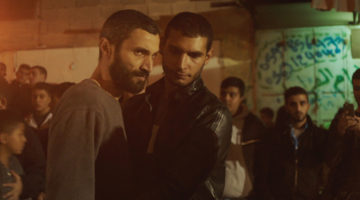TIFF 17: Five Platform Films We Can’t Wait to Watch
Don’t let its age fool you.
Though only three years old, TIFF’s Platform section has quickly earned a reputation for presenting a dynamic and delicious slate of films from some of today’s most prescient authors. Toting a lineup of 12 works from across the globe, the programme’s goal is simple: to provide audiences with direct, no-nonsense access to original international cinema. Last year it played such gems as Jackie, Lady Macbeth, and Moonlight. The year before bowed titles like High Rise, Hurt (by Alan Zweig, who returns to TIFF17 with There is a House Here), and Land of Mine.
This year promises to further the section’s mission with its most diverse lineup yet: a bevvy of films from eight countries, five continents, and men and women in equal measure. Competing for the TIFF Platform Prize, which will be awarded by a jury that includes Chen Kaige, Malgorzata Szumowska, and Wim Wenders, it is a slate guaranteed to make a remarkable impression. To make ticket selection easier (or perhaps harder), here are five titles that I cannot wait to see.
—

Custody, Dir: Xavier Legrand
In 2013, Xavier Legrand proved himself a capable and attentive director with his debut short, the Academy Award–nominated Just Before Losing Everything, which follows Miriam (Léa Drucker), a supermarket employee, who attempts to leave her abusive husband (Denis Ménochet) once and for all. Carefully shot and impeccably acted, the short signalled the rise of a promising filmmaker attentive to the intricate rhythms that exist within familial relationships.
Legrand returns to familiar soil with Custody, an equally harrowing portrait of a family splintered by law and love that begins in media res, or rather, in media repudium: in the middle of divorce. At the film’s center is Miriam Besson (a return performance by Drucker), a recently separated woman filing for exclusive guardianship over her son Julien (Thomas Gloria). Her husband Antoine (again, Denis Ménochet) is a monster, she tells the court. He is violent. Yet when he appears before the jury he is nothing but a model of calm reserve. The judge-in-charge soon makes his ruling: he grants both parties shared custody. And all of a sudden, Julien’s life is split. On one hand is his father, who lusts for reconciliation and a second chance at forging a fraternal bond. On the other is his mother, who wants nothing more than to remove Julien and herself from Antoine’s life.
Faced with these competing forces, and paralyzed with fear for what’s to come, Julien is pushed to the edge of understanding, and Legrand follows him there with a dynamism and coolness far beyond his years. Custody is the calling card for a bold new filmmaker, one that is not to be missed.

If You Saw His Heart, Dir: Joan Chemla
Though I’ve yet to see any of Joan Chemla’s short films, there’s something about her feature debut that piques my interest. Perhaps it is the siren song of her high-powered cast—the electrifying Gael García Bernal (who appears at the TIFF as an In Conversation With… guest) and Marine Vacth (of François Ozon’s Jeune et Jolie fame). Perhaps it is her focus on marginalized ethnic communities. Or perhaps it is her film’s advertisement still, which has haunted me since I saw it a few weeks back: that image of Bernal staring out a window, his upper eyebrow bloodied, his face bathed in bright light, staring in the distance at a figure who has tossed himself, or maybe has simply fallen, from what appears to be a telephone pole. Perhaps it is a combination of all these things.
Loosely adapted from Cuban author Guillermo Rosale’s 1987 novel Boarding Home, If You Saw His Heart straddles the line between realism and expressionism, between film noir and film romantique, painting a sometimes gritty, often troubling portrait of two lonely people who find in one another the determination to move away from the looming shadow of their own fractured pasts to instead forge a future together. His name is Daniel (Bernal). Her name is Francine (Vacth). He is reeling from the death of his closest friend in an accident for which he feels partly responsible. She has her own scars to bear. Troubling and touching in equal measure, If You Saw His Heart promises to be a heartbreaking journey, one that I intend to follow until its close.

The Seen and Unseen, Dir: Kamila Andini
The sophomore feature effort by Kamila Andini — whose short film, Following Diana, played TIFF in 2015 — sounds like a breath of fresh air. Like most of this year’s Platform slate, it is a family drama. But unlike most of this year’s Platform slate, its focus is on the visual rather than the verbal, and furthermore it chronicles the lives of two children rather than two adults.
Set against the sensuous landscape of the Indonesian countryside, Andini follows the lives of 10-year-old twins Tantra and Tantri, two disarmingly charming subjects whose joie de vivre is infectious. Their lives are soon interrupted when Tantra falls seriously ill, and his sister Tantri and their parents are forced to keep a bedside vigil as he slips more and more from consciousness.
Desperately missing her twin, Tantri begins to re-engage with him in her mind, through dream. Though her visions are surreal they are rooted in her day-to-day life, each one punctuated by dance and costume and the wide-eyed wonder of a child. With shades of Apichatpong Weerasethakul, The Seen and Unseen is a wholly unique venture into the headspace of childhood — a must-watch for Wavelenghts fans and fans of surrealism, alike.

Euphoria, Dir: Lisa Langseth
Lisa Langseth has only made two films in her long career as a theatrician and filmmaker. The first, Pure, had its world premiere in 2009, and marked Alicia Vikander’s acting debut. The second was Hotell, which screened at TIFF in 2013, and which marked Vikander’s second collaboration with Langseth. Now, with Euphoria, they unite once more, adding to their coterie the outstanding Eva Green and the ephemeral Charlotte Rampling, in what will without a doubt be a brilliant film chocked full of magnetic performances.
Set within the confines of a sun-dappled country mansion, Euphoria centers on two sisters, both somewhat estranged, who have come together after some time apart to sift through the debris of their lives. Ines (Vikander) is a photographer from New York. She returns home when her sister, Emilie (Green), asks her for company during a mysterious trip. Together, in small rooms and smaller cars, the two venture towards a past that has remained unsettled, ultimately arriving at a location neither quite expected.
Touting supporting performances by Charlotte Rampling and Charles Dance, Langseth’s third film is a finely honed, magnetic meditation on mortality. It is a film that I can’t wait to watch, and watch again.

Dark River, Dir: Clio Barnard
Clio Barnard made waves five years ago with her breakthrough film The Selfish Giant, a stirring social-realist tale about a teen scrap scavenger that was adapted, loosely, from Oscar Wilde’s short story of the same name. Stylishly shot, highly atmospheric, and compared by many to Ken Loach’s Kes, Barnard’s sophomore feature announced the arrival of a distinct (and distinctly English) voice. And this voice comes full force in Dark River, a Yorkshire-set portrait of a family that attempts to reconcile, despite the difficulties that have previously rent them apart.
The incomparable Ruth Wilson (The Affair) stars as Alice, who returns to her childhood farm following the death of her father. Yet, having been absent for 15 years, she arrives surprised: the place is in complete disrepair. Although her deeply troubled brother Joe (Mark Stanley) has been in charge in the interim, it is clear to Alice that he is in no state to make smart decisions. But she cannot tell him this; how can you say such a thing to a complete stranger? So instead, she takes action, imposing order and attempting to give the farm some semblance of a future despite Joe’s protestations. Sparks fly, however, the more Alice interrupts the delicate ecosystem of Joe’s life, and soon it becomes clear the reason for her absence.
As layers of their relationship are peeled back and the past, so much a spectre, begins to make its appearance in the present, Barnard’s camera observes with a delicate voyeurism the nuanced reactions of her high-powered cast. Not a beat, not a single moment is missed. And as the rhythms of their lives — Alice’s and Joe’s — begin to overlap, Barnard reflects with a deeply poetic naturalism the story of two damaged people, two damaged siblings, tied by blood and the past, who could not be more alone in this world.




